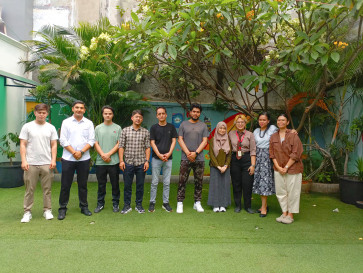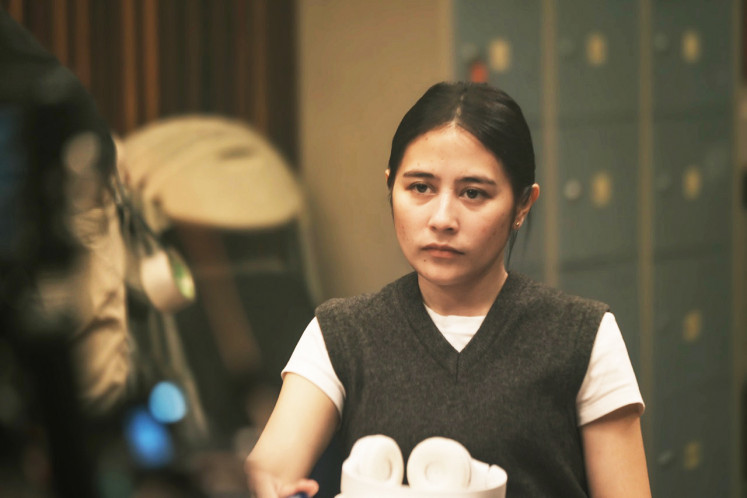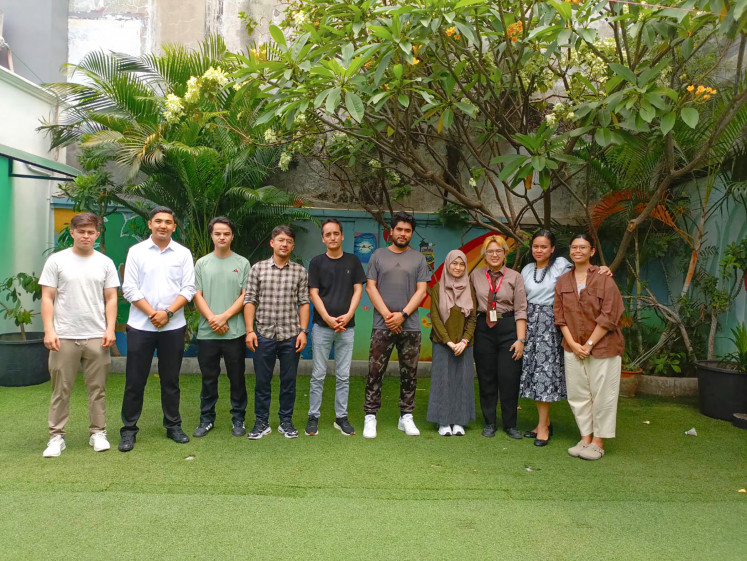.Courtesy of Sinemaku Pictures
The 2022 Indonesian feature film Kukira Kau Rumah (I Thought You Were Home) was, simply put, a game-changer.
Led and coproduced by Prilly Latuconsina, the psychological drama significantly contributed to the emerging trend of Indonesian filmmakers exploring and examining mental health issues.
Cut to the final quarter of 2024, and the subject has now become mainstream. Making a film that was both commercially successful and socioculturally impactful was by no means a small achievement.
Prilly returns to the silver screen this month as both executive producer of and lead actor in the feature drama Bolehkah Sekali Saja Kumenangis (May I Cry Just Once), playing opposite actor-musician Dikta Wicaksono. Although the picture explores a similar theme as Kukira Kau Rumah, Prilly teases that her latest film is “more expansive”.
I couldn't help but wonder, though: In a world where film enthusiasts are quick to criticize themes that are no longer considered niche, would they greet Bolehkah Sekali Saja Kumenangis with the same curiosity as they did with Kukira Kau Rumah?
"I have no such fear," she says, like a seasoned veteran.

Thank you!
For signing up to our newsletter.
Please check your email for your newsletter subscription.
With more than a decade of showbiz experience under her belt (and a Citra Award, to boot), Prilly has learned how to deal with both calm waters and illusory thunderstorms.
“My objective has always been to turn mental health issues into a mainstream subject. I don't want these issues to be treated as too taboo to discuss anymore. I don't want them being a topic too surreal to have a conversation about with our parents."
Prilly and Dikta's characters undergo a cathartic journey in the movie that tackles family abuse and anger. (Sinemaku Pictures)
Layers on screen
In Bolehkah Sekali Saja Kumenangis, Prilly portrays a twenty-something adult named Tari who grapples with emotional and psychological distress as a result of, among other issues, her dysfunctional household.
Dikta, meanwhile, portrays Baskara, who struggles with anger issues due to his family circumstances. Without giving away too much, the feature drama, directed by Reka Wijaya (Akad), touches upon sensitive subjects like domestic violence, oldest child syndrome and duck syndrome.
"We [Indonesians] tend to avoid any conversation that we find uncomfortable," Prilly says about the film's themes.
"That's why it's so weird for us to talk about [for instance] sex and assault. The truth is those are the things that we must talk about. Otherwise, how could we help others who happen to be struggling? How could we make ourselves aware? And how could we educate the younger generation to be aware?"
To deliver the film's message without coming across as overly melodramatic, Prilly had "repeated" conversations with Reka and the production team. It was important that the film nailed the right narrative tone, and not the dark one.
"The story here is pretty heavy, but I didn't want the audiences to feel drained after watching it," Prilly explains.
"I still wanted the audience to feel entertained and have a few ice-breaking scenes. Overall, I wanted the film to be 'packaged' in a light manner."
Character development
Prilly, demonstrating growth as a leader of a feature film production, paid careful attention to how each character was portrayed.
"[Dikta’s character’s] issue was anger, but there should be a difference between him grappling with anger issues and him simply being annoying,” Prilly says.
“His anger issues shouldn’t make this character annoying. Baskara should maintain some lovable qualities so that audiences can empathize with him."
Through Dikta’s eyes, Baskara is akin to a "shell".
"His problem is self-validity. He's confused about how to prove himself to others close to him," Dikta says.
As the film also examines emotional suppression, attention to detail during production was crucial.
For her role, Prilly altered her physicality to reflect the real-life side effects of deliberately suppressing one's emotions.
"For women, stress affects hormones, which lead to weight fluctuations and skin acne, et cetera," Prilly explained.
"We chose to show acne as a symptom because it’s easier to depict in a feature film. We still had to carefully manage it so that the hormonally induced acne looked authentic and not overly theatrical."
"As an actor, we’re always studying humanity. There's no end to it," she said.
.Courtesy of Sinemaku Pictures (Sinemaku Pictures)
When skeptics cry
Much like Prilly’s strong views on mental health, Dikta believes there is still much to explore within its narratives.
Bolehkah Sekali Saja Kumenangis may therefore showcase different sides of this theme that have yet to be depicted on the silver screen. It would be unwise for cinephiles to dismiss the film as just another sob-fest.
"Humans are incredibly diverse. Some are skeptical, some are enthusiastic, some might like [the film], some not so much,” he said.
“It's that variety that I find exciting. Yes, tears are shed in this film. But when those tears are genuine, well, what's wrong with that?”
Ultimately, skepticism fades, but a well-intended piece of art can stand the test of time.
“You might end up loving the film years later, when you watch it on a whim and think, ‘Wow, it’s actually great!’ Right? You just never know,” Dikta says.
Felix Martua is a music and film journalist who's interviewed many artists over the years. He’s recognizable by his signature black jacket, Ghibli collar pin and slightly sinister grin.

























